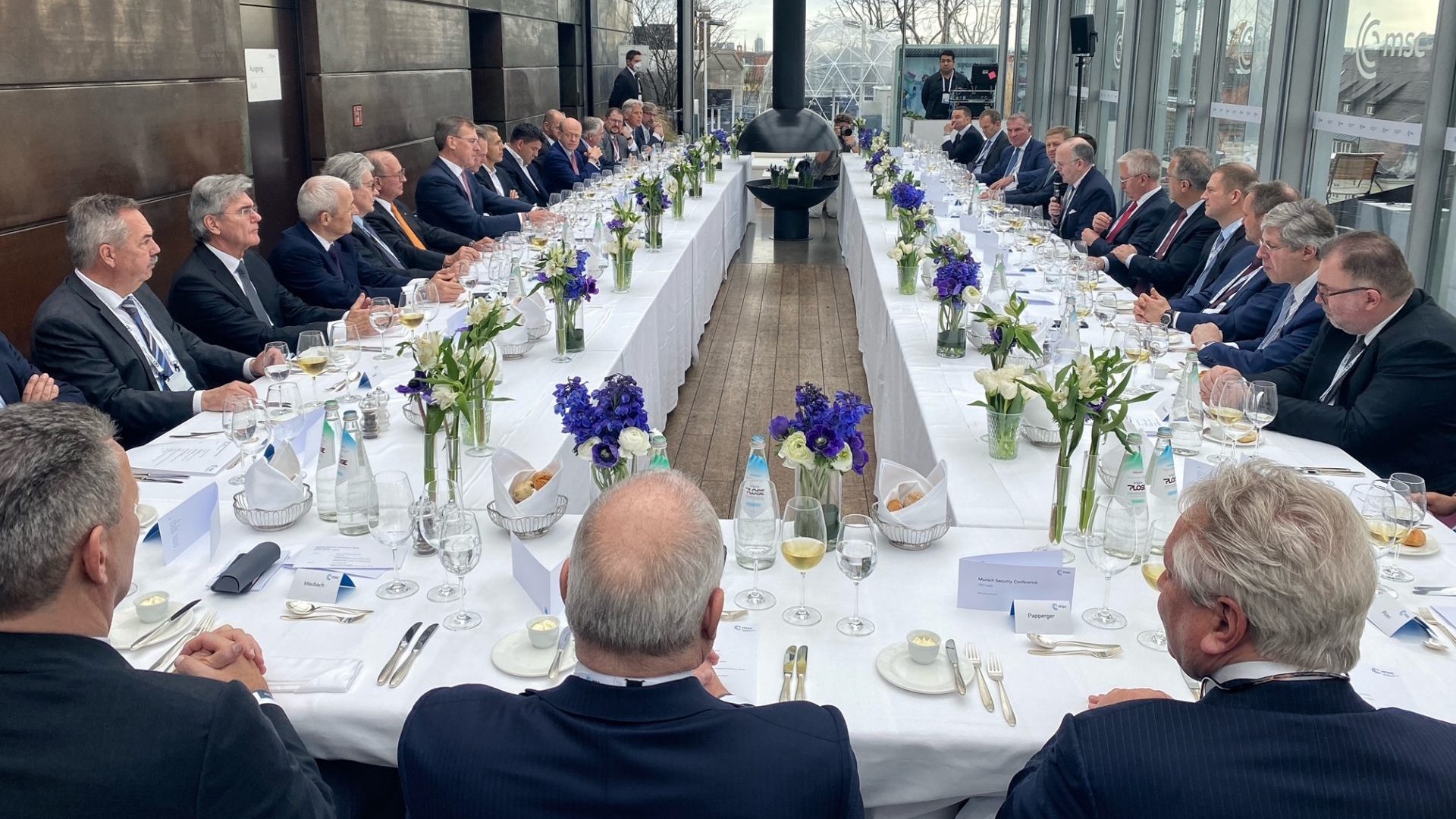We had a visit from Boris Johnson over the weekend, as he joined the Munich Security Conference (MSC). This was a work event in the original sense. No evidence (yet) of a dirndl-chasing prime minister downing Bavarian beer steins.
The venue of the annual meeting is the Bayerischer Hof, a magnificent five-star hotel, family-owned since 1897. The conference is the largest of its kind and attracts heads of state, members of government, MPs, international organisations, military and security experts, journalists, NGOs and managers.
A resistance fighter belonging to the Stauffenberg circle, Ewald-Heinrich von Kleist-Schmenzin, founded it nearly 60 years ago. He wanted to bring security experts together to help prevent future conflicts.
So it isn’t a good omen that Russia’s foreign minister, Sergei Lavrov, gave it a miss this year.
Instead, Ukraine’s president, Volodymyr Zelenskyy, was greeted with standing ovations. The Russian threat was omnipresent. Eventually, however, the German media focus shifted to other news: a PR disaster by the name of MSC CEO Lunch, a side event of the conference.
Journalist Michael Bröcker had posted a picture showing a large table with roughly 30 business leaders and security experts, each of them either an emigob or a mamigob (elderly or middle-aged man in grey or blue suit).
No women at the table, not even a waitress. Which, admittedly, wouldn’t have helped soothe the indignation, outrage and disgust on social media about the blatant lack of diversity among the “warmongers”.
Unsurprisingly, Twitter fought back, calling out the hypocrisy of the usual feminists, who – only hours earlier – had proudly posted pictures of the MSC Ladies’ Dinner (with the Dutch and German secretaries of defence, both women) and boasted about the only “women-only event” at the conference.
Side-note: I refuse to join ladies’ lunches, dinners, etc unless there are at least a few men around (not just to serve food and drinks) because I believe the conversation is too important to exclude men from, if things are to change.
Back to the mamigobs, unfazed by their same-sex lunch: How could a professional and seemingly modern organisation like the MSC allow such a 1950s-revisited event? How can businessmen, whose companies have all implemented environmental, social and corporate governance structures, not realise that something might be slightly off at their homogen(der)ous table in 2022?
In all fairness, they may just say: Come on, the crime I committed was to accept an invitation without having checked the gender quota first… And when I realised, I was too polite to leave (or too hungry).
Before you judge, here’s a bit of maths: According to the organisers, 60 men and 10 women (whose companies sponsor the event) had loosely registered for the lunch. There was room for 25. Fifteen invitations were thus issued to men who had registered (25%), 10 to the women (100%).
But the latter must have thought: lunch is for losers. Most of them cancelled or didn’t show up. Hence the male-only meal.
A staff member of one of the non-attending businesswomen hinted to me that the lunch was antiquated anyway. You may see it as a ritualistic gathering of people, some of whom suffer from FOMO (fear of missing out), some need to reassure themselves of their own importance.
And paradoxically, the feminist uproar about the lack of women gives this exact format more credit than it deserves, at least in the view of the women themselves, successful business leaders who had something better to do than to sit through it.
To save the MSC diversity reputation: 45% of all panellists at this year’s conference were female. Which can only have been achieved with a massive effort. The rule of thumb in Germany is: to convince one woman to go on a panel or talk show, you need to call at least six. If you call six men, however, they will all gladly join.
There is progress though: the French initiative #JamaisSansElles (roughly “never without women”) has made men across Europe pledge they’ll never be on an all-male panel.
German executive boards have also improved.
Up until 2019, there were more board members called Thomas or Michael than women. By now, 13,4 per cent of the top executives in listed companies are female, 2021 seeing the highest rise since 2013, when EY started the analysis in around 160 companies. But still half of the companies examined are solely run by men on top-level (which will be legally banned for most of them eventually).
By comparison, 31,1% of top management in the 30 heavyweight listed US companies is female. UK: 27.4%, Sweden: 27.1%. Germany: 18%.
And if women in Germany do make it to the top, they earn more money. In 2020 male DAX board members received £1.47m in compensation packages, on average; their female colleagues £1.93m.
So, really: no need to buy them lunch.




